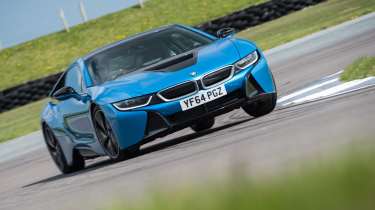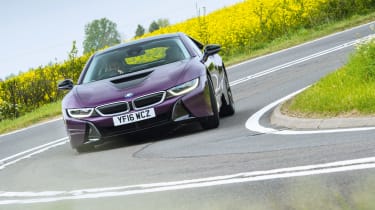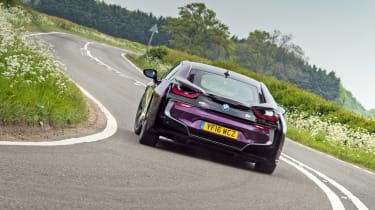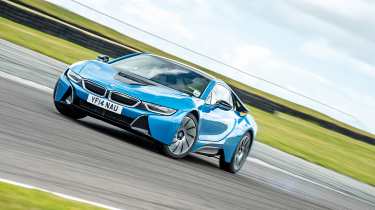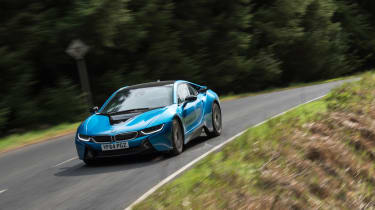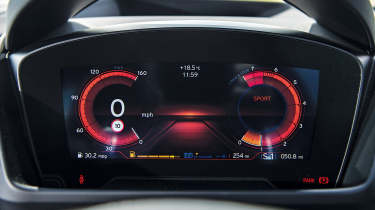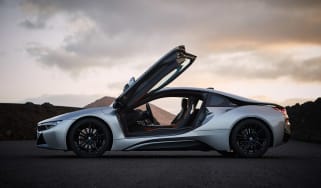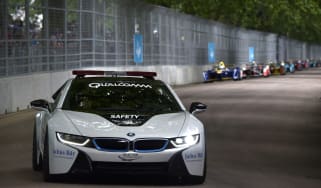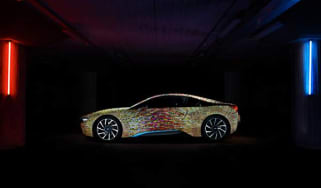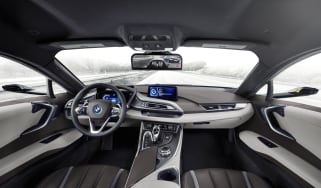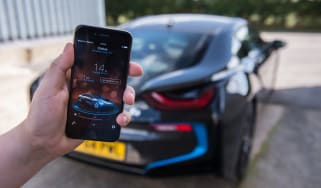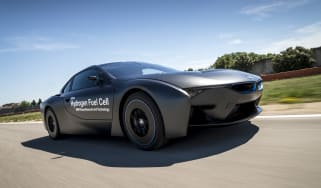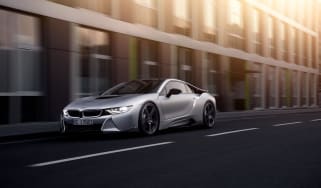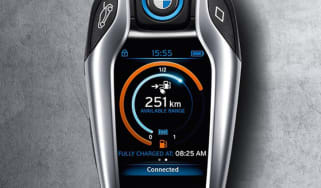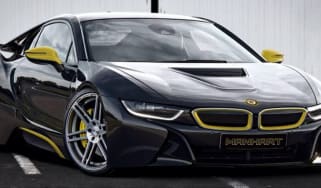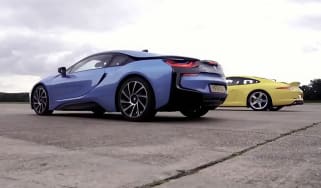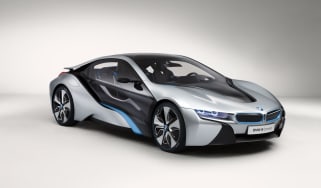BMW i8 (2014-2020) – review, history, specs, and buyer’s guide
A genuinely ground-breaking car, the BMW i8 showed plug-in cars and driving pleasure didn’t need to be strangers
It was the future, once. Now, the BMW i8 has been consigned to the history books by its maker, with grotesque SUVs and more conventional EVs taking its place. But while BMW’s i8 didn’t resonate with buyers at the time, it’s become the very definition of a car that was ahead of its time, with the new car market course correcting from an overtly electric-only focus, to hybrid vehicles. Apart from its prescience, the i8 was a dedicated sports car featuring advanced construction and powertrain technology, dramatic styling and a genuinely appealing if atypical driving experience.
We’ve always been fond of the i8 at evo, even seeing fit to include an example in evo Car of the year 2014, where it finished sixth – ahead of BMW’s own F80-generation M3 in ninth. While we’d ultimately choose a Porsche 911 for a twisty road or racetrack, the i8’s ability to provide a different, more cerebral thrill, while delivering fine fuel economy and offering excellent long-distance comfort made it a genuine pleasure.
BMW i8 history
There were signs BMW was thinking about a new sports car as early as 2009. As is often the case, BMW previewed its early ideas with a concept, 2009’s Vision EfficientDynamics. The EfficientDynamics name, a nod to BMW’s new slogan for pairing its traditional driving characteristics with greater environmental friendliness, was also widely applied to the back of fuel-sipping diesel 1-series and 3-series.
The concept though was no mere hatchback or saloon, instead taking the form of a low and sleek sports car, more M1 than 1M in its form factor. Dramatic glass doors cut low into the sills and its bodywork was heavily sculpted around the wheels and roofline. While some of the more extreme colours, lights and details eventually faded, the theme remained admirably consistent, first through 2011’s i8 Concept revealed at the Frankfurt motor show (alongside the i3 Concept), and then on the eventual i8 production car launched in 2013.
By then the glass doors had gone, though they retained their butterfly opening mechanism. There was plenty of technology too, not just in the drivetrain that paired a mid-mounted, Mini-derived 1.5-litre three-cylinder turbo (making 228bhp) with a front-mounted electric motor (129bhp), but also in the construction. Like the upright i3 electric city car, the i8 used a carbonfibre (CFRP) central tub, to which subframes were attached at either end carrying the engine and motor.
This kept the car relatively light despite the need to stow heavy batteries and a pair of powertrains – BMW quoted a kerbweight of just 1535kg, so well within the Porsche 911 ballpark. Performance was close, too, with a 0-62mph sprint of 4.4 sec, aided by all-wheel drive traction thanks to that front motor, and while a 155mph top speed won’t set any records the i8 still offered that important grand-tourer quality of having something in reserve even if big numbers are already showing on the speedometer.
> BMW i8 – the car world's greatest misses
Slick aerodynamics no doubt played a part, and also made the i8 a rather fantastic car in which to cover distance. Well, to a point, because two of the i8’s most glaring faults also chipped away at its GT-like qualities. One, luggage space was poor, though in the fixed-roof model the rear seats were adequate for extra storage. And two, with two power sources and a bank of batteries crammed into a mid-engined car, the supermini-sized 42-litre fuel tank means reasonably regular stops at motorway speeds – around 300 miles, give or take.
BMW i8 review
Driving it remains a unique experience. You can creep around in EV mode for a decent distance (a good 30-ish miles in later models, thanks to a 11.6kWh battery pack rather than the original 7.1kWh) and at respectable speeds, though the sensation of the front wheels pulling you around is an interesting one in a supercar-style BMW. The electric assistance does make for quick-acting punch when you ask for it though, and the three-cylinder engine makes an interesting noise, augmented through the cabin speakers.
The complicated drivetrain demanded an equally ingenious transmission. Essentially, power from the petrol engine is transferred to the rear-wheels using a six-speed auto and the front handles the electric motor using a two-stage automatic box. The driver controls the six-speed either by leaving it in auto mode or via the shift paddles on the steering wheel.
What’s most impressive with the performance of the i8 is how the two systems work together to create a very clever four-wheel drive setup. They both fill in for each other, with the electric motor providing power at the lower end of the rev range and the turbo three-cylinder unit filling in at the top.
Its dynamic weaknesses are the steering, which can come across as remote and lifeless and the ultimate lack of grip across the front axle thanks to the tiny 195-section front tyres initially frustrates. Compared to some fat-tyred M-cars though, there’s a novel glassiness to the i8’s gait. The slim rubber does make for understeer in some conditions, but tune in to the way the i8 does things, accelerating and decelerating smoothly and guiding rather than hustling the car and it can satisfy in its own unique way.
Nevertheless the i8 always fell a little way short of more conventional rivals for outright thrills – but it is better to drive than we imagined it would be. We did have issues with the brake pedal feel. The i8 uses regenerative braking to help recharge the batteries, meaning the car switches between its two brake systems during a braking manoeuvre. Being an earlier attempt at this kind of technology, it’s perhaps unsurprising that pedal feel is inconsistent.
In everyday driving, the i8 is refined, it rides comfortably for a car of such performance and there are no histrionics from the complex drivetrain around town. When in electric-only mode it has enough straight-line performance to dismiss most traffic away from the lights, all without making anything more than a distant hum.
BMW introduced the i8 Roadster in 2018, which was very literally a coupe with its roof cut off – BMW’s engineers realised the carbon tub’s structural stiffness was more than up to the task, though they still installed extra bracing anyway, leading to a 60kg bump in kerbweight.
The i8 got a power boost at the same time spanning the coupe and new Roadster, for a combined 369bhp but sadly, it wasn’t to hang around for long, the i8 arguably departing the lineup as a more relevant offering than ever before – very much the right car at the wrong time.
What we said
BMW i8, evo Car of the year test 2014 (evo 203, eCoty 2014)
‘Everything is very serene for the first few miles as I just enjoy the various sensations. Even when the little 1.5-litre turbocharged three-cylinder kicks in, the refinement of the whole car is so good that it still has an air of calm about it. The steering is very light and lacks any real feel, but it’s also clean and precise and the overall effect is one of ease as you guide the car through corners.
‘In terms of pace it feels on a par with the Cayman [981 GTS] across the ground and there are plenty of times when you really do forget the whole hybrid angle and just enjoy the i8 as a fantastically accomplished 357bhp sports car. Yes, if you look at the dials then you can get quite fixated by what’s going on, but the technology is so well executed that if you’ve got a good bit of road or another car to chase in front of you then you can simply enjoy driving and the innovative engineering melts into the background.’
BMW i8 Roadster, Tour de Force (evo 258, March 2019)
‘This hybrid really hustles out of tight corners, the front motor compensating for any hesitation that might be present in the turbocharged triple’s responses. It’s like someone has released the rope on a trebuchet as you squeeze the throttle and feel an instant, proportional urge in your intended direction.
‘Better still is the noise. The three-cylinder has a characteristic tone, and its clear, electronically enhanced sounds actually feel appropriate. The i8 is such a technological car there’s none of the incongruity you get with piped-in noise in a simplistic hot hatch or traditional sports car. The real thrill comes from surging into and out of every corner accompanied by the wooooooeeeeeee of the electric motor harvesting and delivering its power… like sitting on board an R18 e-tron or Porsche 919 as it brakes deep into each chicane on the Mulsanne and brawls out of the other side.’
BMW i8 rivals – from Porsche 911 to Honda NSX
Slotting the BMW i8 into a performance car segment and defining its rivals was difficult throughout its life. At the time the well-lavished Porsche 911 (991) Carrera 4 GTS was a good fit, also just eclipsing six figures in price and offering 430bhp from a naturally aspirated flat six – a very exciting thing. Dynamically, it was better in the traditional sense, but no amount of bright Guards Red paint turns heads like an i8 and it nor any other rival, can offer the adjustability of the i8 at such low limits and speeds.
A fellow hybrid supercar, and technological tour de force, the all-wheel drive NSX, was £30k more expensive at the time and flaunted the same exotic panache as the i8. Its performance however elevated the Honda into a higher plain of supercardom.
BMW i16 – the i8’s supercar successor that never was
Though no direct replacement ever materialised, a supercar referred to by BMW as the i16, was worked on using the i8 as a basis. This was set to be a much more overtly performance-focused car, with more power and more tyre but still with heavy reliance on electrification and hybridity.
The stillborn project was revealed by BMW head designer Domagoj Dukec, who said the car was on track for production before ‘the world changed in 2020’. While we can clearly see the i8 in its silhouette, bits of BMWs that have since come to fruition are visible – the latest M2 in its front lights and oddly, the iX in its rears, to name a few.
Specs
| i8 (2013) | i8 Roadster (2018) | |
| Engine | 1499cc turbo, electric motor | 1499cc turbo, electric motor |
| Power (bhp) | 357 | 369 |
| Torque (lb ft) | 236 engine, 184 motor | 236 engine, 184 motor |
| Weight | 1535kg | 1595kg |
| Power-to-weight | 244bhp/ton | 235bhp/ton |
| 0-62mph | 4.4sec | 4.6sec |
| Top speed | 155mph | 155mph |
| Price | £99,895 (2013) | £127,105 (2020) |
BMW i8 buying guide and what to pay
Questions about the reliability and longevity of electrified vehicles might be a hot topic in 2025 but they’re nothing new. They’ve hung over the prospect of second-hand i8 ownership since its introduction like a belligerent storm cloud.
Generally speaking though, the i8 has proven to be relatively reliable with only niggling ancillary issues like air conditioner compressors causing some owners grief. The struts on the butterfly doors can lose their strength and become audibly grumbly, the door locks can be problematic and windscreens have been known to crack. Check the dash for coolant lights too, and that the fuel filler flap works.
When it comes to the battery, a car that’s been looked after – cycled sympathetically and not been left to sit without being plugged in – ought to be fine. You can have the mileage and condition of the battery checked regardless, as well as the car’s error history overall. It’s also worth checking the car A ) still has its charger and B ) that it’s still functional. As ever, good service and MOT history will be indicators as to what kind of life the car you’re looking at has led. Be sure all recalls have been addressed, too.
The i8 will look after you in terms of regular consumables. The engine, while more difficult to access for servicing, comes from a Mini, so shouldn’t break the bank in terms of parts. Likewise the relatively modest brakes and skinny tyres will attack the wallet with a far lighter touch than most ‘proper’ sports and supercars. Worth noting: having work done through BMW dealers directly is expensive and expertise can be thin on the ground for what is a strange car that’s beginning to advance in years. Our advice? Find a specialist who knows the cars, that you’d be happy to use should you take the plunge.
There’s no escaping that the i8 is a strange car, from its carbon construction to its powertrain. So parts and knowledge won’t be in abundance like they are for 911s and other more conventional contemporaries of the i8. The i8 Roadster, having come out four years later than the Coupe, is rarer and as such, commands a premium more often than not.
BMW i8 – £29,000 to £60,000
BMW i8 Roadster – £50,000 to £80,000
